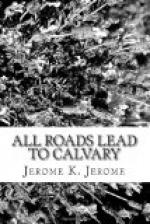“It always seemed to me immoral, the marriage ceremony,” the Human Document was explaining. She was a thin, sallow woman, with an untidy head and restless eyes that seemed to be always seeking something to look at and never finding it. “How can we pledge the future? To bind oneself to live with a man when perhaps we have ceased to care for him; it’s hideous.”
Miss Tolley murmured agreement.
“Our love was beautiful,” continued the Human Document, eager, apparently, to relate her experience for the common good; “just because it was a free gift. We were not fettered to one another. At any moment either of us could have walked out of the house. The idea never occurred to us; not for years—five, to be exact.”
The secretary, at a sign from Miss Tolley, made a memorandum of it.
“And then did your feelings towards him change suddenly?” questioned Miss Tolley.
“No,” explained the Human Document, in the same quick, even tones; “so far as I was concerned, I was not conscious of any alteration in my own attitude. But he felt the need of more solitude—for his development. We parted quite good friends.”
“Oh,” said Miss Tolley. “And were there any children?”
“Only two,” answered the Human Document, “both girls.”
“What has become of them?” persisted Miss Tolley.
The Human Document looked offended. “You do not think I would have permitted any power on earth to separate them from me, do you?” she answered. “I said to him, ’They are mine, mine. Where I go, they go. Where I stay, they stay.’ He saw the justice of my argument.”
“And they are with you now?” concluded Miss Tolley.
“You must come and see them,” the Human Document insisted. “Such dear, magnetic creatures. I superintend their entire education myself. We have a cottage in Surrey. It’s rather a tight fit. You see, there are seven of us now. But the three girls can easily turn in together for a night, Abner will be delighted.”
“Abner is your second?” suggested Miss Tolley.
“My third,” the Human Document corrected her. “After Eustace, I married Ivanoff. I say ‘married’ because I regard it as the holiest form of marriage. He had to return to his own country. There was a political movement on foot. He felt it his duty to go. I want you particularly to meet the boy. He will interest you.”
Miss Tolley appeared to be getting muddled. “Whose boy?” she demanded.
“Ivanoff’s,” explained the Human Document. “He was our only child.”
Flossie appeared, towing a white-haired, distinguished-looking man, a Mr. Folk. She introduced him and immediately disappeared. Joan wished she had been left alone a little longer. She would like to have heard more. Especially was she curious concerning Abner, the lady’s third. Would the higher moral law compel him, likewise, to leave the poor lady saddled with another couple of children? Or would she, on this occasion, get in—or rather, get off, first? Her own fancy was to back Abner. She did catch just one sentence before Miss Tolley, having obtained more food for reflection than perhaps she wanted, signalled to her secretary that the note-book might be closed.




